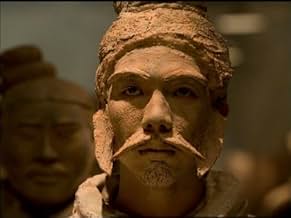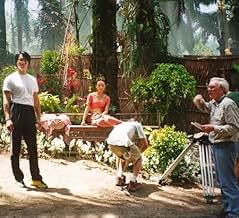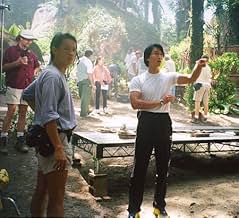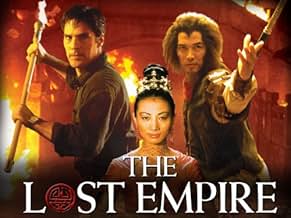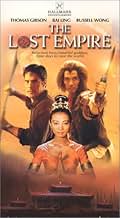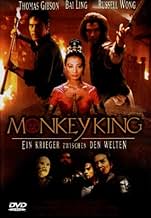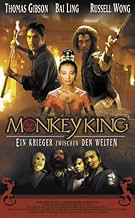Guerreiros do Império Perdido
Título original: The Lost Empire
AVALIAÇÃO DA IMDb
5,5/10
1,8 mil
SUA AVALIAÇÃO
Adicionar um enredo no seu idiomaAmerican journalist seeks lost Chinese manuscript, journeying with magical humanoid ape, pig-man, and ex-cannibal friend. Adventure based on renowned tale.American journalist seeks lost Chinese manuscript, journeying with magical humanoid ape, pig-man, and ex-cannibal friend. Adventure based on renowned tale.American journalist seeks lost Chinese manuscript, journeying with magical humanoid ape, pig-man, and ex-cannibal friend. Adventure based on renowned tale.
- Indicado para 1 Primetime Emmy
- 4 indicações no total
Explorar episódios
Avaliações em destaque
The Lost Empire, or The Monkey King, as it was called when I saw it on the Hallmark Network, is a silly film, but a very enjoyable one. It attempts to put a new spin on the Chinese classic, Journey to the West, which tells the story of how a monk went on an epic journey to recover some sacred scriptures, aided by the mischievous Monkey King, the gluttonous Pigsy and the sombre Sandy.
In this modern version the companions are the same, but the monk is replaced by a modern American sinologist, and the "scripture" is the original manuscript of Journey to the West itself, which is about to be destroyed by the "five traditional masters", who represent the forces of conservatism. Confused? It gets worse; if the book is destroyed, all the human progress that has taken place since the book was written will be reversed and the world will revert to feudalism. To cap it all, the Jade Emperor, Confucius and Kuan Yin, the goddess of compassion, are all weighing in.
With a scenario like this, the film cannot help but being absurd in places, but the absurdity, intentional or otherwise, is part of the fun, as it was in the original Journey to the West, which is a comedy as well as an analogy of the spiritual journey. Viewers who have read Journey to the West will enjoy the references to it; others can sit back and enjoy the visual richness, which as well as some spectacular scenes and SFX, includes Bai Ling as Kuan Yin, looking far more sexy than a goddess of compassion ought to (but then that's one of the twists in this tale as well).
In this modern version the companions are the same, but the monk is replaced by a modern American sinologist, and the "scripture" is the original manuscript of Journey to the West itself, which is about to be destroyed by the "five traditional masters", who represent the forces of conservatism. Confused? It gets worse; if the book is destroyed, all the human progress that has taken place since the book was written will be reversed and the world will revert to feudalism. To cap it all, the Jade Emperor, Confucius and Kuan Yin, the goddess of compassion, are all weighing in.
With a scenario like this, the film cannot help but being absurd in places, but the absurdity, intentional or otherwise, is part of the fun, as it was in the original Journey to the West, which is a comedy as well as an analogy of the spiritual journey. Viewers who have read Journey to the West will enjoy the references to it; others can sit back and enjoy the visual richness, which as well as some spectacular scenes and SFX, includes Bai Ling as Kuan Yin, looking far more sexy than a goddess of compassion ought to (but then that's one of the twists in this tale as well).
This movie is an insult to the beautiful historical classic work from Wu Cheng'en. It brutally involves theme's that do not fit at all with the story line. Such as a Caucasian man falling in love the Goddess of Mercy and she falling in love with him. Even though, in order to make one movie out a of a 3 volume work, selecting only parts from the book is necessary. This movie has misunderstood the meaning of the book and used elements to make it a sad abstract of the novel. He has gone past the key element of the book: the enlightenment, the search for the Way from five totally different characters, each representing an element of human nature. The Tang priest, Sun Wukong the monkey, lazy and clumsy Pig, hideous Friar Sand and the Dragon sun, changed into a white horse. It has wiped out every Buddhist element from the story, while that's the backbone of this book. How he ridiculed key figures from Chinese history and culture (Quan Yin, Confucius) and not even in a adult and serious way.
This movie does by no means represent the wonderful Chinese Classic `Journey to the West', or literally `Notes of a Journey to the West' and you may have already figured out that I was sadly disappointed with it.
This movie does by no means represent the wonderful Chinese Classic `Journey to the West', or literally `Notes of a Journey to the West' and you may have already figured out that I was sadly disappointed with it.
Yes, the weaknesses of this movie are numerous. The acting is, for the most part, horribly wooden, particularly with the lesser supporting characters. The real-world history is way off (among other flaws already pointed out in other reviews, "Journey to the West" is, according to what I've read at least, closer to 400 years old than 500, and the official objection to the manuscript was its nontraditional form rather than its content). Some of the characters, particularly four of the Five Traditional Masters, are way underdeveloped. Portraying Confucius as a self-serving sycophant is just *wrong.*
If you're already familiar with the original story of "Journey to the West" and can't bear to see it butchered -- which is exactly what happens here -- then follow the one-star ratings given here and avoid this movie like the plague.
For anyone else, this is a fun piece of work. It was hardly Emmy-worthy in any category (with the possible exception of Bai Ling's impassioned performance as the Goddess of Mercy) and has numerous plot holes not worthy of David Huang, but the story travels on well with only a couple of relatively minor diversions (well, I guess NBC wanted to make sure they had a good two-part miniseries), one can really care about those characters that do receive proper development, and can wonder and worry about the story's outcome.
If you're already familiar with the original story of "Journey to the West" and can't bear to see it butchered -- which is exactly what happens here -- then follow the one-star ratings given here and avoid this movie like the plague.
For anyone else, this is a fun piece of work. It was hardly Emmy-worthy in any category (with the possible exception of Bai Ling's impassioned performance as the Goddess of Mercy) and has numerous plot holes not worthy of David Huang, but the story travels on well with only a couple of relatively minor diversions (well, I guess NBC wanted to make sure they had a good two-part miniseries), one can really care about those characters that do receive proper development, and can wonder and worry about the story's outcome.
This movie is a contemporary take on the classic Chinese novel "Journey to the West," which is a fictionalized account of the legends around the Buddhist monk Xuánzàng's pilgrimage to India during the Táng dynasty in order to obtain Buddhist religious texts called sutras.
The ministers have imprisoned the writer of the book, and are attempting to destroy it to reverse time back to traditional Chinese life, i.e. before any modernization. The modern world will be destroyed unless The Scholar From Above (Thomas Gibson) can enter the underworld and save it.
Don't make any mistake. Gibson would not have taken one step except for the fact that he was following the luscious Bai Ling, who anyone would follow to the gates of Hell.
He rescues Sun Wukong the Monkey King (Russell Wong - Romeo Must Die), and is joined by Zhu Bajie(Pigsy)(Eddie Marsan - 21 Grams, Vera Drake) and Sha Wujing (Friar Sand) (Kabir Bedi - Octopussy) to save the book and save the world. It is almost a Wizard of Oz adventure, as they all have personal issues to resolve in addition to the mission.
Of course, Kuan Yin (Bai Ling) appears any time he utters a prayer. Thankfully, for the many appearance of Bai Ling make this film worth watching. She is usually in another spectacular costume each time she appears.
Besides spectacular costumes, the sets were lavishly decorated. The special effects were magnificent, and the martial arts displays exciting.
It was overly long, but most great adventures are. Anyway. that is more time to watch Bai Ling.
The ministers have imprisoned the writer of the book, and are attempting to destroy it to reverse time back to traditional Chinese life, i.e. before any modernization. The modern world will be destroyed unless The Scholar From Above (Thomas Gibson) can enter the underworld and save it.
Don't make any mistake. Gibson would not have taken one step except for the fact that he was following the luscious Bai Ling, who anyone would follow to the gates of Hell.
He rescues Sun Wukong the Monkey King (Russell Wong - Romeo Must Die), and is joined by Zhu Bajie(Pigsy)(Eddie Marsan - 21 Grams, Vera Drake) and Sha Wujing (Friar Sand) (Kabir Bedi - Octopussy) to save the book and save the world. It is almost a Wizard of Oz adventure, as they all have personal issues to resolve in addition to the mission.
Of course, Kuan Yin (Bai Ling) appears any time he utters a prayer. Thankfully, for the many appearance of Bai Ling make this film worth watching. She is usually in another spectacular costume each time she appears.
Besides spectacular costumes, the sets were lavishly decorated. The special effects were magnificent, and the martial arts displays exciting.
It was overly long, but most great adventures are. Anyway. that is more time to watch Bai Ling.
Lost Empire, a VERY strange title for a retelling of the old Chinese classic adventure "Journey to the West", is a mixed bag of a film. David Hwang's screenplay is in many respects a sequel to the original story, as opposed to being a modern rendition of the original story. I regard this as a mistake as I believe Mr. Hwang lost more by giving up on the original characters than he gained by having a modern setting.
Good points: The lovely Ling Bai did a good job as the Bodhisattva of Compassion (Kwan Yin). Some scenes with Monkey and the "Scholar from Above" went well (mainly the scenes when Monkey rescues his subjects on Flower Fruit Island). Some interplay between "Sandy" and the "Scholar from Above" was funny. Some of the art design for the palace of the Jade Emperor was good (but NOT the throne room, yuk!).
Bad points: Too many explosions. A really ugly and totally wrong portrait of Confucius (I could go on for some time but I'll stick with this key point: Confucius was a materialist. He had no interest in religion and spirits. He was only interested in how a good state was run. The depiction of Confucius in this movie is totally at odds with EVERYTHING that Confucius stood for.) The last half-hour of the movie was anti-climactic, over-wrought, and uninteresting.
Deeper problems: Journey to the West is, at its core, at Buddhist story about the quest to attain enlightenment (along with the fun stuff about beating demons). This story (Lost Empire) takes place AFTER Monkey and Sandy have achieved their ultimate state. They are both "supposed" to be enlightened beings. The problem with this is that a) they don't act like enlightened beings, and b) there isn't much drama possible when you are enlightened. You can really tell the weakness in the writing when Kwan Yin has to tell Monkey's old teacher that "Monkey HAS been blessed by the Buddha". If you need a 3rd party (a goddess no less) to convince other people that you have become enlightened and have been blessed by the Buddha, well, its clear to me that the story is saying one thing, but doing another.
In fact, none of the characters behaves "in character". At least not like the characters that you enjoyed when reading "Journey to the West".
Deepest problem: the story (Lost Empire) is trying to both be and not be "Journey to the West" at the same time. Its trying to both be true to original ideas and be "modern" and up-to-date at the same time. Its trying to be a sequel that retells the original story. It is, in short, a total mess at a very deep level. -- Colin Glassey
Good points: The lovely Ling Bai did a good job as the Bodhisattva of Compassion (Kwan Yin). Some scenes with Monkey and the "Scholar from Above" went well (mainly the scenes when Monkey rescues his subjects on Flower Fruit Island). Some interplay between "Sandy" and the "Scholar from Above" was funny. Some of the art design for the palace of the Jade Emperor was good (but NOT the throne room, yuk!).
Bad points: Too many explosions. A really ugly and totally wrong portrait of Confucius (I could go on for some time but I'll stick with this key point: Confucius was a materialist. He had no interest in religion and spirits. He was only interested in how a good state was run. The depiction of Confucius in this movie is totally at odds with EVERYTHING that Confucius stood for.) The last half-hour of the movie was anti-climactic, over-wrought, and uninteresting.
Deeper problems: Journey to the West is, at its core, at Buddhist story about the quest to attain enlightenment (along with the fun stuff about beating demons). This story (Lost Empire) takes place AFTER Monkey and Sandy have achieved their ultimate state. They are both "supposed" to be enlightened beings. The problem with this is that a) they don't act like enlightened beings, and b) there isn't much drama possible when you are enlightened. You can really tell the weakness in the writing when Kwan Yin has to tell Monkey's old teacher that "Monkey HAS been blessed by the Buddha". If you need a 3rd party (a goddess no less) to convince other people that you have become enlightened and have been blessed by the Buddha, well, its clear to me that the story is saying one thing, but doing another.
In fact, none of the characters behaves "in character". At least not like the characters that you enjoyed when reading "Journey to the West".
Deepest problem: the story (Lost Empire) is trying to both be and not be "Journey to the West" at the same time. Its trying to both be true to original ideas and be "modern" and up-to-date at the same time. Its trying to be a sequel that retells the original story. It is, in short, a total mess at a very deep level. -- Colin Glassey
Você sabia?
- CuriosidadesLoosely based on the story from classical Chinese Literature "Journey to the West".
- Citações
Nicholas Orton: So I might never get rich, buy my own jet, or even maintain a stock portfolio. But when I look in her eyes, I know that none of these things really matter.
- ConexõesReferences A Mosca da Cabeça Branca (1958)
Principais escolhas
Faça login para avaliar e ver a lista de recomendações personalizadas
- How many seasons does The Monkey King have?Fornecido pela Alexa
Detalhes
- Data de lançamento
- Países de origem
- Idiomas
- Também conhecido como
- The Monkey King
- Empresas de produção
- Consulte mais créditos da empresa na IMDbPro
Contribua para esta página
Sugerir uma alteração ou adicionar conteúdo ausente

Principal brecha
By what name was Guerreiros do Império Perdido (2001) officially released in Canada in English?
Responda



